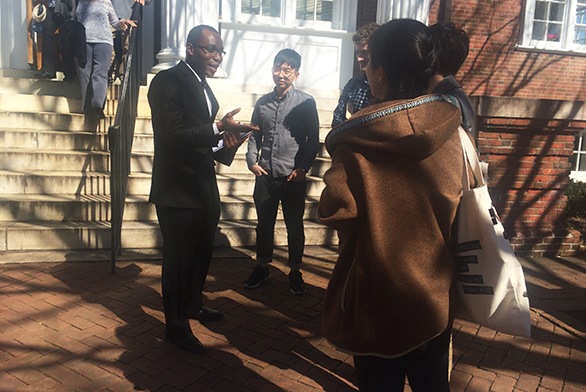Exploration of Ideas
February 24, 2017 | By Tim Pratt

The King William Room at St. John’s College in Annapolis went silent as senior Jermaine Brown and a committee of tutors filed into the room.
Roughly three dozen students, faculty and staff members who were gathered around the room in the Barr-Buchanan Center rose to their feet. Brown and the tutors, donned in robes and mortarboards, took their spots around a table in the center.
“Madam chair, I present Jermaine Brown, candidate for the degree of Bachelor of Arts to be examined on his essay entitled ‘The Relationship Between Space and the Human Mind: An Evaluation of Kant’s Transcendental Aesthetic,’” said tutor Carl Page, one of three on the committee.
With that, Brown’s senior oral examination—the culmination of his four years at St. John’s—was under way.
Senior “orals,” as they are commonly known, began February 20 on the St. John’s Annapolis campus and are set to begin February 27 on the Santa Fe campus. They are a follow-up to the senior essays students turned in earlier this month.
During an oral examination, a committee of tutors sits down with the student and challenges the implications and conclusions the student put forth in their essay. No degree is awarded unless the essay and the oral examination are satisfactory.
The goal is for the student to deepen the thinking invested in the essay, says Annapolis Dean Joe Macfarland.
“Sometimes you’ll read a paper that’s interesting … and then you’ll have the conversation in the oral and realize the student has this wealth of thought behind the paper that’s ready to come out,” Macfarland said. “So the oral is, in essence, a great event where you can engage all of the intellectual work they have been doing. That can be very exciting to be a part of and very gratifying for them.”
Brown’s committee consisted of chairperson Rebecca Goldner, Page and fellow tutor Chester Burke. The group asked questions on temporal and transcendental states, intuition, perception and sensation, and other topics addressed in Brown’s essay.
The inquiries led to in-depth conversations among the group, more so than a standard question-and-answer session.
“Here’s how I’ll attempt to answer that question,” Brown said at one point. “Maybe you can help me out here.”
Different oral examinations have different dynamics, Macfarland said. Some tutors may be more open to questions from the student; others may push harder during their questioning, he said.
Macfarland still remembers the first oral he participated in as a tutor many years ago. The student was well-prepared and had done a fine job on his essay, Macfarland said. As a result, Macfarland felt a little bit of pressure.
“I think I was more nervous than the student,” he said with a laugh.
While tutors spend plenty of time preparing for the orals—reading the essays and often going back to reread parts of the works being discussed in them—Johnnies take even longer. Their topics are submitted in the fall, then they have four weeks to write their essays at the beginning of the spring semester.
In the two-plus weeks since then, Brown read and reread his essay, met with his advisor, had friends read his work and spoke with former students to seek advice on the oral examination process. He wanted to make sure he was ready for whatever the tutors may ask. And he was, explaining his reasoning on certain points and acknowledging there were other questions and connections he was still trying to figure out.
After an hour, Brown’s examination ended. He and the tutors stood, donned their mortarboards and headed toward the door. Those who were observing also stood.
When the tutors and Brown exited, the room erupted in applause.
Minutes later, many who sat in on the oral examination waited outside the building. They gave Brown another round of applause when he emerged from the tall, white door.
Brown thanked the group and exchanged hugs and handshakes. He said he was excited, but “extremely nervous” before the exam. But when it was over, he reveled at how quickly the time passed.
“The oral doesn’t feel like one hour, and I think every senior should just enjoy it,” he says. “It’s a once-in-a-lifetime opportunity.”
Santa Fe Dean Matt Davis said he hopes students walk away from their orals with similar perspectives.
“The senior essay generally can be a high point of a student’s experience,” Davis said. “When the orals work out and you really feel like you’ve had a good conversation about a book, that really can be quite a rewarding experience for tutors and for students.”

